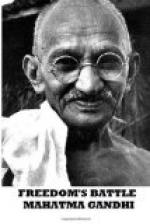it religiously. I am here to bear witness that
he has been following out this plan of non-violent
Non-co-operation to the very letter and I am asking
India to follow this non-violent non-co-operation.
I tell you that there is not a better soldier living
in our ranks in British India than Shaukat Ali.
When the time for the drawing of the sword comes, if
it ever comes, you will find him drawing that sword
and you will find me retiring to the jungles of Hindustan.
As soon as India accepts the doctrine of the sword,
my life as an Indian is finished. It is because
I believe in a mission special to India and it is
because I believe that the ancients of India after
centuries of experience have found out that the true
thing for any human being on earth is not justice based
on violence but justice based on sacrifice of self,
justice based on Yagna and Kurbani,—I cling
to that doctrine and I shall cling to it for ever,—it
is for that reason I tell you that whilst my friend
believes also in the doctrine of violence and has
adopted the doctrine of non-violence as a weapon of
the weak, I believe in the doctrine of non-violence
as a weapon of the strongest. I believe that
a man is the strongest soldier for daring to die unarmed
with his breast bare before the enemy. So much
for the non-violent part of non-co-operation.
I therefore, venture to suggest to my learned countrymen
that so long as the doctrine of non-co-operation remains
non-violent, so long there is nothing unconstitutional
in that doctrine.
I ask further, is it unconstitutional for me to say
to the British Government ‘I refuse to serve
you?’ Is it unconstitutional for our worthy
Chairman to return with every respect all the titles
that he has ever held from the Government? Is
it unconstitutional for any parent to withdraw his
children from a Government or aided school? Is
it unconstitutional for a lawyer to say ’I shall
no longer support the arm of the law so long as that
arm of law is used not to raise me but to debase me’?
Is it unconstitutional for a civil servant or for a
judge to say, ’I refuse to serve a Government
which does not wish to respect the wishes of the whole
people?’ I ask, is it unconstitutional for a
policeman or for a soldier to tender his resignation
when he knows that he is called to serve a Government
which traduces his own countrymen? Is it unconstitutional
for me to go to the ‘krishan,’ to the agriculturist,
and say to him ’it is not wise for you to pay
any taxes if these taxes are used by the Government
not to raise you but to weaken you?’ I hold
and I venture to submit, that there is nothing unconstitutional
in it. What is more, I have done every one of
these things in my life and nobody has questioned
the constitutional character of it. I was in Kaira
working in the midst of 7 lakhs of agriculturists.
They had all suspended the payment of taxes and the
whole of India was at one with me. Nobody considered
that it was unconstitutional. I submit that in




